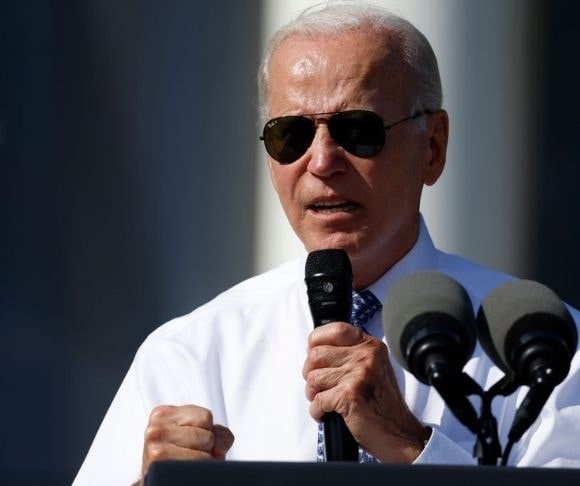President Joe Biden recently told a White House crowd celebrating the passage of the Inflation Reduction Act, “We spend, but we pay.” However, the numbers surrounding the budget deficit contradict this notion, suggesting the statement is as nonsensical as most speeches delivered by the man who would make drunken sailors blush. So, yes, it is true: Democrats spend. However, the financial data confirm they do not cover their obligations, relying instead on debt monetization. So, what do the dollars and cents convey to American households who must adhere to responsible money management?
Budget Deficit Grows
 The White House would have us believe that Mr. Biden has transformed into a stalwart of fiscal conservatism; that the president is now grabbing a calculator, going line by line through the multi-trillion-dollar budget, and pinching pennies. Not quite, says the Committee for a Responsible Federal Budget (CRFB).
The White House would have us believe that Mr. Biden has transformed into a stalwart of fiscal conservatism; that the president is now grabbing a calculator, going line by line through the multi-trillion-dollar budget, and pinching pennies. Not quite, says the Committee for a Responsible Federal Budget (CRFB).
According to a new report by the non-profit watchdog, the administration has installed public policies – through executive actions and legislative pursuits – that will add $4.8 trillion to deficits between 2021 and 2031. Even when ignoring the American Rescue Plan (ARP), the president has still added $2.5 trillion to the budget shortfall. And, of course, this is in addition to the trillions of dollars that the federal government planned to borrow prior to Biden arriving at 1600 Pennsylvania Avenue.
The most notable bills that exacerbated the nation’s indebtedness were the ARP ($1.85 trillion), student debt relief and forgiveness ($750 billion), the Fiscal Year 2022 Omnibus Bill ($625 billion), the Infrastructure Investment and Jobs Act of 2021 ($370 billion), Honoring Our PACT Act of 2022 ($280 billion), and net interest ($700 billion).
“Excessive borrowing will lead to continued inflationary pressures, drive the national debt to a new record as soon as 2030, and triple federal interest payments over the next decade – or even sooner if interest rates go up faster or by more than expected,” the CRFB said in a statement. “With inflation at a 40-year high and debt headed for record levels, substantial deficit reduction will be needed to put the country on a sustainable fiscal course.”
Indeed, with the Federal Reserve raising interest rates, Washington’s spending, which will require additional borrowing and debt monetization, will add to the mounting generational fiscal pressures. But while the White House is celebrating because the pandemic-era extraordinary measures expired (see below), Biden and his enablers in the nation’s capital are worsening the pecuniary plight of the world’s biggest economy.
Joe Biden – The Next Milton Friedman

Joe Biden (Photo by Anna Moneymaker/Getty Images)
Last year, the deficit was approximately $2.78 trillion, the second largest in US history. This year, the annual shortfall will be roughly $1.03 trillion – the August fiscal gap widened 29% year-over-year to $220 billion. Still, the budget deficit will be much lower than when Biden took office 18 months ago. Are Democrats crunching the numbers and keeping track of the nickels, dimes, quarters, and pennies?
The president routinely states that the deficit has been reduced significantly so far in his term. Technically this is true, but it is not because his “record on fiscal responsibility is second to none.” Instead, temporary COVID-related stimulus and relief efforts, which led to astronomical shortfalls, have ended. This offered some respite for Uncle Sam, who had been combing through his pockets only to find lint and moths.
Ultimately, it is not much of an achievement since anyone, be it former President Donald Trump or Sen. Bernie Sanders (I-VT), would have presided over a declining budget deficit. The real victory would have been substantially slashing federal spending, not allowing it to total nearly $5.5 trillion in the first 11 months of the current fiscal year. As the eminent economist Milton Friedman wrote, the primary issue is not determining how to cover the cost’s costs, but rather the spending itself. Not tackling this challenge will add to inflationary pressures, something that even the Federal Reserve Bank of Kansas City noted:
“Trend inflation is fully controlled by the monetary authority only when public debt can be successfully stabilized by credible future fiscal plans. When the fiscal authority is not perceived as fully responsible for covering the existing fiscal imbalances, the private sector expects that inflation will rise to ensure sustainability of national debt. As a result, a large fiscal imbalance combined with a weakening fiscal credibility may lead trend inflation to drift away from the long-run target chosen by the monetary authority.”
Yeah, no, this ain’t happenin’, as the cool kids on the block like to say to their pals.
White House Budget
For anyone who read the administration’s latest budget document, taxpayers will see that the White House plans to accumulate $14.4 trillion worth of deficits over the next decade. The bright spot in this is that the Congressional Budget Office (CBO) estimates the final figure could be $1.3 trillion lower because officials are underestimating higher revenues. What’s $1 trillion between friends anyway? Overall, the federal budget deficit, which is added to the national debt, will represent as much as 6% of the gross domestic product. This is unsustainable. But, of course, these are numbers from the incumbent administration – not the next one or two successors. The succeeding Republicans and Democrats will present their own proposals, inevitably adding to the ocean of red ink.




